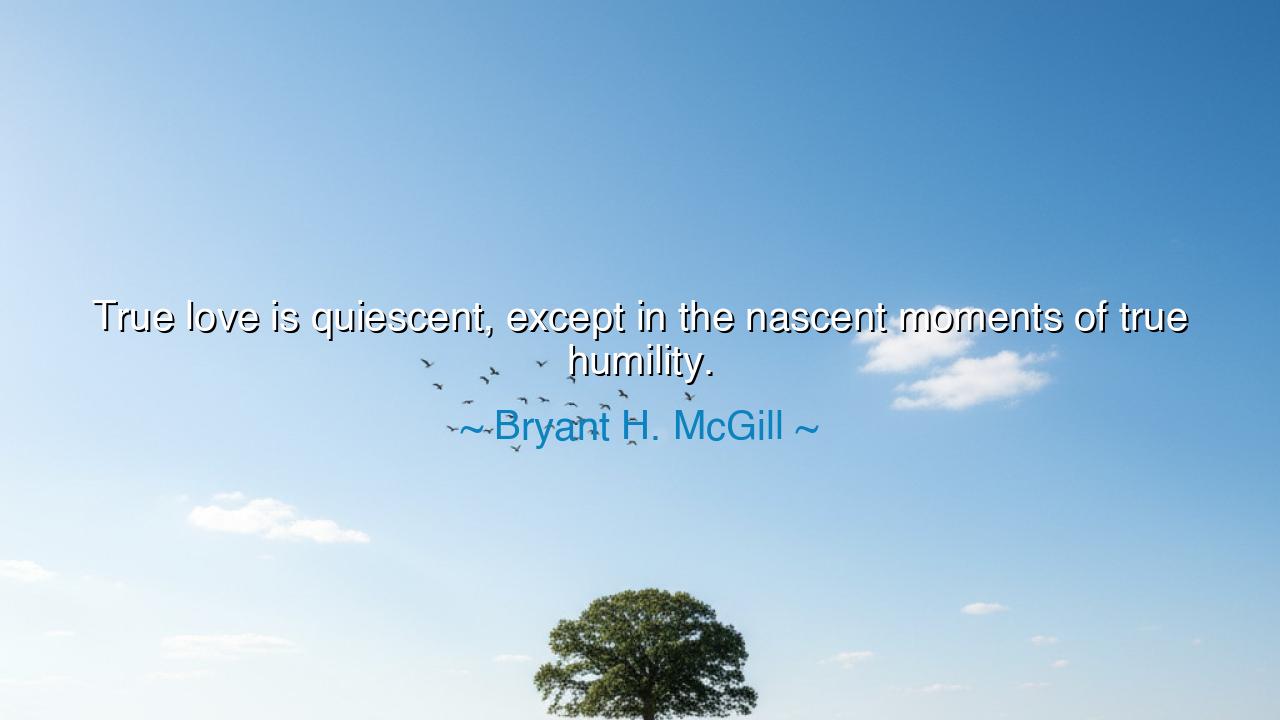
True love is quiescent, except in the nascent moments of true






“True love is quiescent, except in the nascent moments of true humility.” — Bryant H. McGill
In this profound and subtle saying, Bryant H. McGill, the philosopher of peace and self-mastery, unveils a truth that lies at the very heart of spiritual love: that true love is not a storm of passion, nor a fever of desire, but a still and sacred power — quiescent, serene, resting quietly in the soul. Yet there are moments when this stillness stirs, when love awakens in its purest form — and those are the nascent moments of true humility, when the self is silent, and the heart opens without pride, fear, or demand. In such moments, love ceases to be a possession and becomes a revelation.
McGill’s words arise from a deep moral and spiritual philosophy — one that sees love not as emotion, but as awareness, as a conscious act of presence. In the modern world, love is too often confused with noise and excitement: declarations, cravings, jealousies, and demands. But true love, he teaches, is quiet. It does not boast or clamor; it simply is. Like the ocean in calm, it holds infinite depth beneath its surface. It needs no performance, no justification, no proof. It exists in stillness, content within itself. Yet, when humility dawns — when the ego bows before the mystery of another soul — that quiescent love begins to move, to give, to forgive, to serve.
The ancients understood this truth well. The sages of the East spoke of love and humility as twin virtues — inseparable as breath and life. In the Bhagavad Gita, Krishna tells Arjuna that the wise man, filled with love, “is humble like the earth,” bearing all things with gentleness. For only the humble heart can hold love without corrupting it. Pride turns love into possession; fear turns it into need. But humility turns love into grace — an offering rather than a demand. Thus McGill’s words echo not only the wisdom of his age, but that of all ages: love awakens fully only when the self surrenders.
Consider the life of Francis of Assisi, who renounced wealth, power, and pride to walk barefoot among the poor. He did not speak of love in lofty terms; he lived it in silence and service. His love for the world was quiescent, not burning with ambition but glowing with compassion. Yet in the moments of true humility — when he bent to wash the feet of lepers, when he spoke to birds as equals — his love became radiant and alive. It was in his surrender, not his strength, that love became divine. This is what McGill means: that love, though still, becomes most powerful when touched by humility.
In our own lives, we may see that the love which lasts is not the love that shouts, but the one that listens. True love is patient, kind, and silent in its depth. It does not seek to dominate, but to understand. It remains calm through storms, because it is rooted in something eternal. Yet even the calmest sea stirs when the winds of humility pass over it — when we recognize our smallness before another’s suffering, when we apologize, when we forgive, when we admit we do not know everything. In those moments, love moves again, fresh and new — nascent, reborn through humility.
McGill’s insight is also a warning: that love without humility hardens into pride, and pride is love’s slow death. The lover who cannot kneel will never truly embrace. The friend who cannot forgive will never truly connect. The parent who cannot listen will never truly understand. Love’s greatness is not in its dominance, but in its surrender. It grows strongest when it bows — when it sees in another not an object to possess, but a soul to honor.
Therefore, O seeker of truth, take this teaching into your heart: do not confuse movement with life, nor passion with love. Let your love be quiet but deep, like a river that nourishes without noise. And when the time comes — when pride softens and humility dawns — let your love awaken and act. Speak gently. Forgive freely. Serve without thought of return. For it is in those humble beginnings that love becomes truly alive — not the love of the self, but the love of the spirit.
In the end, true love is like a divine fire that sleeps in the heart until humility breathes upon it. It does not roar; it glows. It does not demand; it gives. And when the soul bows low enough to let it rise, that quiet love becomes the most powerful force in heaven and earth — a love that asks for nothing and yet gives everything.






AAdministratorAdministrator
Welcome, honored guests. Please leave a comment, we will respond soon